De Duitse dichter, schrijver en uitgever Wulf Kirsten werd geboren op 21 juni 1934 in Klipphausen bij Meißen. Zie ook alle tags voor Wulf Kirsten op dit blog.
KURFÜRSTENDAMM
Eisenzahnstraße, abgewinkelten arms.
emaille. gingkobäumchen in reih und glied.
astlos. vorübergehend an pfähle gebunden,
laufen neben den passanten her. so tun,
als ob. und wie sie marschieren.
pomologie, preußisch gedrillt. flexibel
gekrümmt bogenlaternen, eisenkunstguß.
nostalgisch verschnörkelt.
die geschmacksbildende idee alternierend
und eine spur zu absichtlich
zwischen die baumschulflüchter gesetzt.
abgeplatzte platanenrinde: heißt das,
ich soll entziffern, was die urbanisierte
natur mir achtlos vor die füße wirft?
eingemummt in ein giftgrünes brillengestell
die bankbesetzerin und ihr ausgesperrtes
eigentum. hinter einem wall sparriger
bündel das sperrgut mitten auf der avenue.
die einzige und ihr eigentum. anschauungs-
modell. sorgsam verschnürt und gehütet.
die geheimnisse des lebens. fremdbestimmt.
die krümel teilt sie mit den tauben, fittich,
fußkrank und stahlblau. ein ausgewildertes
team. gut eingespielt. auf einem endlosband
gestreckt fassadenfrohes grafitti-esperanto.
der mauerabtrag von spechten handlich
geklopft, oder waren die heiligen brocken
bloß auf feindwall getrimmt? verhökert
an einer straßenecke in Berlin.
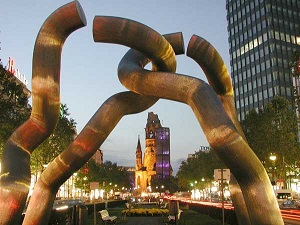
Wulf Kirsten (Klipphausen, 21 juni 1934)
De Kurfürstendamm in Berlijn
De Vlaamse dichter Frans Joseph de Cort werd geboren in Antwerpen op 21 juni 1834.Zie ook alle tags voor Frans de Cort op dit blog en ook mijn blog van 21 juni 2011 deel 2.
Mijne moedertaal
Mijne moedertaal, mijne moedertaal,
Wie of haar ook kleinere,
Min ik als mijn vaderland,
Sta ik voor met hand en tand!
O mijn Neerlands, ja mijn Neerlands,
Dat houd ik steeds in ere!
Mijne moedertaal, mijne moedertaal,
Wat andre komt daarnevens!
Zwaardgekletter, klokkenklank,
Snarenspel en minnezang,
O mijn Neerlands, ja mijn Neerlands,
Dat alles zijt gij tevens!
Mijne moedertaal is de schoonste taal,
En zou ze ’t ook niet wezen,
Haar verkiezen zou ik nog,
Want zij is de mijne toch!
O mijn Neerlands, ja mijn Neerlands,
Wees eeuwig mij geprezen!
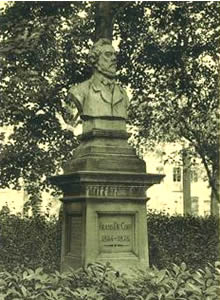
Frans de Cort (21 juni 1834 – 18 januari 1878)
Monument in het stadspark van Antwerpen
De Belgische, Franstalige schrijver Patrick Lowie werd geboren op 21 juni 1964 in Brussel. Zie ook alle tags voor Patrick Lowie op dit blog.
Uit: L’enfant du Kerala
« Le beau jeune homme aux surprenantes allures lit d’autres infos. Des allures d’adolescents. Un sourire aux lèvres l’embellissant encore. Il lit les infos sur d’honnêtes citoyens devenus en peu de temps terroristes. Sur des étrangers renvoyés dans leur pays. Peu importent les prétextes. L’Italie est aux côtés de l’Empire. Pour retrouver le sien ? Ce n’est pas la première fois qu’elle se trompe d’histoire. La péninsule a changée. Fellini et Pasolini sont morts. Darwin est rayé des manuels scolaires. On reprend l’idée d’Adam. Et Eve pour la cuisine. Le sourire de l’adolescent cache une infinie tristesse.
L’Italie est donc redevenue fasciste. Noire. L’expulsion de pauvres se fait en silence. Les hommes en noir du Vatican interdisent les mariages interreligieux. Les relations hors mariage. Le préservatif. L’homosexualité. Ils financent des dictatures. Forcément. Va-t-on à nouveau interdire le mariage aux artistes ? Va-t-on à nouveau jeter du fenouil aux pieds des pédés calcinés sur les bûchers ?
Le jeune homme au sourire craquant se refuse d’acheter les best-sellers qu’on lui impose dans les médias. Ceux qu’on voit partout. Ceux qui n’ont rien à offrir. Il évite d’acheter les livres qui ne sont pas écrits par ceux qui prétendent les avoir écrit. Il entre dans une librairie. Y découvre un minuscule très vieux carnet. Presque un livre : « Théâtre à Bethléem ». Il l’achète.
Il ne peut s’empêcher de passer devant la gelateria.
S’offrir un cornet à la straciatella. »
Il les attend sur un banc : elle et la fin de ses cours. Attente interminable. Long tout est trop long. Bruyant aussi. Il ne s’entend plus penser. Elle le rejoint sur le banc. Ils retournent chez eux. Elle lui dit je t’aime en arabe. Une langue qu’il ne comprend plus. Il ne peut que sourire. Rougir un peu.”
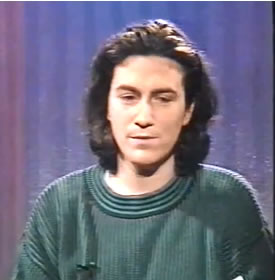
Patrick Lowie (Brussel, 21 juni 1964)
In 1989
De Amerikaanse dichter Henry S. Taylor werd geboren op 21 juni 1942 in Loudoun County, Virginia. Zie ook alle tags voor Henry S. Taylor op dit blog.
The Way It Sometimes Is
At times it is like watching a face you have just met,
trying to decide who it reminds you of—
no one, surely, whom you ever hated or loved,
but yes, somebody, somebody. You watch the face
as it turns and nods, showing you, at certain angles,
a curve of the lips or a lift of the eyebrow
that is exactly right, and still the lost face
eludes you. Now this face is talking, and you hear
a sound in the voice, the accent on certain words—
yes! a phrase . . . you barely recall sitting outside,
by a pool or a campfire, remarking
a peculiar, recurring expression. Two syllables,
wasn’t it? Doorknob? Bathroom? Shawcross? What the hell
kind of word is shawcross? A name; not the right one.
A couple of syllables that could possibly be
a little like something you may once have heard.
So the talk drifts, and you drift, sneaking glances,
pounding your brain. Days later a face occurs to you,
and yes, there is a resemblance. That odd word, though,
or phrase, is gone. It must have been somebody else.
Yes, it’s like that, at times; something is, maybe;
and there are days when you can almost say what it is.
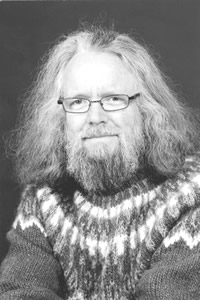
Henry S. Taylor (Loudoun County, 21 juni 1942)
De Amerikaanse schrijfster en feministe Mary McCarthy werd geboren op 21 juni 1912 in Seattle. Zie ook alle tags voor Mary MaCarthy op dit blog.
Uit: The Group
“Kay was glad when Harald tooled home (that was one of his favorite expressions) for dinner, instead of eating with the others in that speak-easy. Once he had brought one of the authors, and Kay had made salmon loaf with cream pickle sauce. That would have to be the night they broke for dinner early, and there was quite a wait (‘Bake 1 hour’, the recipe went, and Kay usually added fifteen minutes to what the cookbook said), which they had to gloss over with cocktails. Harald did not realize what a rush it was for her, every day now, coming home from work at Mr Macy’s and having to stop at Gristede’s for the groceries; Harald never had time any more to do the marketing in the morning. And, strange to say, ever since she had started doing it, it had been a bone of contention between them. He liked the A&P because it was cheaper, and she liked Gristede’s because they delivered and had fancy vegetables – the Sutton Place trade, Harald called it. Then Harald liked to cook the same old stand-bys (like his spaghetti with dried mushrooms and tomato paste), and she liked to read the cookbook and the food columns and always be trying recipes with her glasses on and measuring the seasonings and timing everything; cooking was a lively art and she made it academic and lifeless. It was funny, the little differences that had developed between them, in the course of three months; at first, she had just been Harald’s echo. But now, if he said why not be sensible and open a can (this was another night when dinner was not ready), she would scream that she could not do that, it might be all right for him, but she could not live that way, week in, week out, eating like an animal, just to keep alive. Afterward, when he had left, she was sorry, and made a resolution to be a better planner and budget her preparation time, the way the food columns said.”
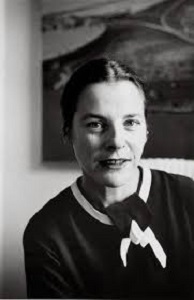
Mary McCarthy (21 juni 1912 – 25 oktober 1989)
De Russische dichter Aleksandr Tvardovsky werd geboren in Oblast Smolenskop 21 juni 1910. Zie ook alle tags voor Aleksandr Tvardovsky op dit blog.
I was killed near Rzhev (Fragment)
I was killed near Rzhev
In a nameless bog,
In fifth company,
On the Left flank,
In a cruel air raid
I didn’t hear explosions
And did not see the flash
Down to an abyss from a cliff
No start, no end
And in this whole world
To the end of its days –
Neither patches, nor badges
From my tunic you’ll find
I am where the blind roots
Seek for food in the dark
I am where the rye waves
On a hill in the dust
I am where the cockerel cries
In the dew of the dawn
I am where your cars
Tear the air on highways
Where – small stalk to small stalk –
River’s weaving its grass
Where for the remembrance
Even my mother won’t come
In a bitter year’s summer
I was killed. And for me
Neither news nor bulletins
Will come after this day
Vertaald door Mike Munford
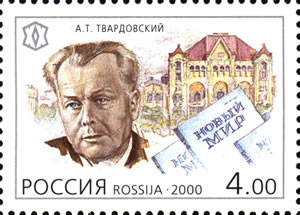
Aleksandr Tvardovsky (21 juni 1910—18 december 1971)
De Russische schrijver Fyodor Gladkov werd geboren op 21 juni 1883 in Chernavka. Zie ook alle tags voor Fyodor Gladkov op dit blog.
Uit: Cement (Vertaald door A.S. Arthur en C. Ashleigh)
‘”I don’t know what you mean by Utopia, Comrade Shidky. If you don’t pronounce the word factory, the workmen will say it. What are you jawing about: the factory is the past or the future? If the workers are banging their heads against the factory every day- as they are- then the factory is there, and it’s waiting for workers’ hands to run it. What’s all the joke about with you, Comrades? Have you been to the factory? Have you seen the Diesel engines and the workmen? The factory is a whole little town and the machines are all ready to run. Why have the workers been robbing the factory? Why do rain and wind eat into the concrete and iron? Why does destruction go on? And the rubbish heaps pile up? Why have the workers nothing to do except fool around with empty bellies? The worker isn’t a broody hen: you can’t ask him to sit down on the eggs and hatch chicks! And you keep on telling him that the factory isn’t a factory, but an abandoned quarry, and he spits on you then and curses with all his might. How could he treat you otherwise? he’s* right in stripping the factory and dragging it bit by bit to his home; it would all go to the devil anyway. You’ve been filling his head with all sorts of beautiful language, but what have you done to make him a class-conscious proleterian instead of a cheese-paring haggler? That’s the way you have to put the question, my dear Comrades.”
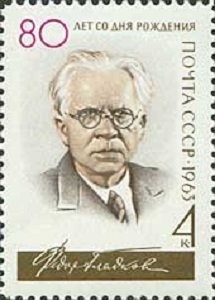
Fyodor Gladkov (21 juni 1883 – 20 december 1958)

1 thoughts on “Wulf Kirsten, Frans de Cort, Patrick Lowie, Henry S. Taylor, Mary McCarthy, Aleksandr Tvardovsky, Fyodor Gladkov”
De commentaren zijn gesloten